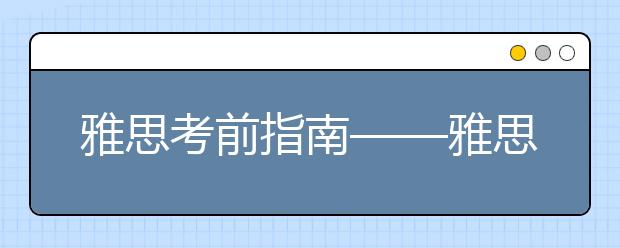当前城市:淄博[切换]
- 手机雅思无忧

扫码登录
雅思考试主要是通过对考生听、说、读、写四个方面英语能力的考核,综合测评考生的英语沟通运用能力,实现“沟通为本”的考试理念。对于雅思考生来说,也有很多考试难点和政策盲区需要帮助解答。今天雅思无忧网小编准备了雅思阅读:Whats in store,希望通过文章来解决雅思考生这方面的疑难问题,敬请关注。
以上就是雅思无忧网为您准备的访问雅思无忧网(https://www.yasi.cn/),了解更多雅思考试新消息,新动态。
雅思培训 雅思口语话题:a shop or store
雅思口语话题:a shop or store
今天环球教育口语名师张娜老师来给雅思考生们介绍一个新的雅思口语话题:a shop or store。
2021年11月28日 10:11 雅思阅读扫读练习方法
雅思阅读扫读练习方法
对于雅思的学习,很多学员学习起来还是有一点困难的,特别是阅读阶段,为了大家更好的进行雅思阅读,今天小
2021年05月26日 13:25 2019雅思变化有哪些?2019雅思阅读与写作预测
2019雅思变化有哪些?2019雅思阅读与写作预测
2019年的雅思考试已经过去了两个月,在这两个月内,我们依然可以大胆的预测出2019雅思变化有哪些。
2021年05月27日 22:36 雅思考前指南——雅思阅读相关的备考建议
雅思考前指南——雅思阅读相关的备考建议
雅思考前指南——雅思阅读相关的备考建议为大家带来雅思阅读的考点题型全解析和在备考过程中可能出现的疑难
2021年05月28日 18:20 2019雅思考试注意事项全解析 附雅思阅读听力评分标准
2019雅思考试注意事项全解析 附雅思阅读听力评分标准
雅思考试跟国内考试在内容和考核方式上有很多的不同,即是在考试的注意事项上,也有很多独特的地方,大家须
2021年05月28日 22:16 雅思阅读评分标准及分数解读 附20组必背阅读替换词清单
雅思阅读评分标准及分数解读 附20组必背阅读替换词清单
本文为大家带来2019年雅思阅读评分标准表及9-0分的各个分数段的分数解读,看看你的阅读水平目前处于
2021年05月28日 22:21 不是10种也不是13种 简明讲解雅思阅读5大题型特征及解法
不是10种也不是13种 简明讲解雅思阅读5大题型特征及解法
雅思阅读题型多样,各有各的难点和特点。若能突破其难点,掌握其特点,对在规定时间内完成题目并保证正确率
2021年05月29日 00:42 雅思阅读考试2019最新评分标准与复习方法讲解
雅思阅读考试2019最新评分标准与复习方法讲解
雅思阅读考试,其实算是中国烤鸭们的重头戏,因为我们都是从高考,大学四六级甚至考研的大量阅读理解题目里
2021年05月29日 06:23 【小站雅思】2019年下半年雅思阅读趋势分析
【小站雅思】2019年下半年雅思阅读趋势分析
综合2019年上半年的考试情况看,雅思阅读文章题材平稳,但是题型与文章内容的融合度在逐渐增高,总体难
2021年05月29日 11:19 【扫盲贴】雅思阅读考试简要介绍
【扫盲贴】雅思阅读考试简要介绍
雅思考试一共分为四个考核部分,包括听说读写四个单项。在此,小站教育针对雅思阅读考试,给大家做一个简要
2021年05月30日 12:39